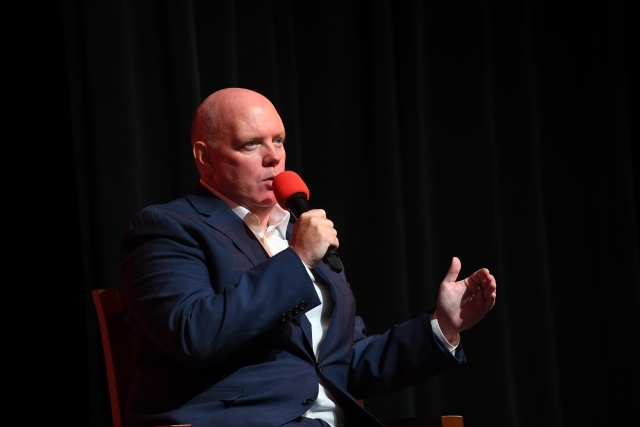
Like so many other organizations that serve disaffected populations, Covenant House International grappled with the effects of the COVID-19 pandemic on the homeless youth to whom they minister. They had little time to develop action plans, respond to state and local mandates, and keep their services running without interruption—but through the tireless dedication of their administrators, staff, and volunteers, these goals were accomplished.
Last fall, Kevin M. Ryan, President and Chief Executive Officer of Covenant House International, was named holder of the 2019–20 Vincentian Chair of Social Justice. He has presented three lectures about his organization’s mission and specific aspects of its programming. In the interest of safety, Mr. Ryan’s fourth lecture, “Helping Homeless Youth amidst COVID-19,” transitioned to a virtual setting and was held on September 9 via Cisco Webex.
“Just as we were preparing for our fourth panel, this pandemic got underway, and I was surrounded by some miraculous warriors for justice who were tireless in trying to help young people be safe as the pandemic took root in the United States,” Mr. Ryan said.
Joining him for this special presentation were Bill Bedrossian, Chief Executive Officer of Covenant House California, and Alieizoria “Alie” Redd, Ph.D., Executive Director of Covenant House Georgia.
Mr. Ryan discussed the initial shock the pandemic caused within the walls of Covenant House and how they scrambled to meet the challenge. “I have been so proud of how fearless our staff has been and how committed they are to continue serving our young people. Very early on we lost a staff person at one of our sites, and it was shocking and tragic. It also had me so worried about what was coming our way because we were only in the second or third week of the pandemic.”
At the beginning of 2020, Mr. Ryan did not know what personal protective equipment was, but he soon found himself in “desperate competition” with other agencies to purchase masks, gloves, and face shields. In one instance, Mr. Ryan had only a few hours to raise funds for a massive purchase, but luckily a Covenant House board member covered the cost. “Our community has wrapped themselves around us, and we continue to be a place of sanctuary and a place of safety for our young people.”
As the pandemic took root, Covenant House was expanding its services, providing a continuum for young people from emergency shelter to permanent housing. Mr. Ryan noted Covenant House had just experienced a 62 percent increase in their permanent housing programs before the pandemic struck—then his world turned upside down.
In a matter of weeks, the executive floor of Covenant House’s New York City headquarters was converted to isolation units for symptomatic clients. From coast to coast, and in their international locations, Covenant House repurposed conference rooms, offices, and drop-in centers for the safe quarantine of young people.
“We were overwhelmed very quickly,” he stressed.
Mr. Ryan saw an unprecedented surge in food insecurity for young people amidst COVID-19. Despite that, all of the Covenant House sites managed to provide more than one million meals to children and youth, which represents a 75 percent increase over their typical outreach.
Equally as critical are the mental health needs of these children, which have been exacerbated by the pandemic. Mr. Ryan spoke of young people amid their college careers (who may have overcome homelessness), who were forced to return to the streets when their dorms closed, or who were back at a shelter competing for a stable Wi-Fi signal. Even those clients living at Covenant House lost their outside support systems while being forced to shelter in place.
Covenant House has tried to ameliorate some of the challenges by being more diligent about the psychological impacts facing these young people. “Whereas mental health services were a part of what we did, we now make sure that every young person has access to mental health counselors,” said Mr. Bedrossian. “We try to make sure that they get their needs met.”
“This panel was extremely informative, and it helped me understand just how drastic the effects of COVID-19 have been on those suffering from housing and food insecurity,” noted Rebeka A. Humbrecht, a dual major in English and Public Relations, and a student at St. John’s University’s Staten Island, NY, campus.
She added, “One thing that stuck with me the most was this question: What does sheltering in place mean for someone who does not have shelter? Organizations like Covenant House have extended their services by feeding more people, turning offices into quarantine housing, and helping their clients with heightened trauma and mental health needs. Covenant House and the people they represent need support—now more than ever.”
“Being homeless is tough enough for some youth in our cities,” observed Rev. Patrick J. Griffin, C.M., Executive Director, Vincentian Center for Church and Society. “Being without shelter and sick with COVID-19 compounds the human misery. Covenant House provides health care, as well as housing and meals, to thousands of these young people. Mr. Ryan and his colleagues stand in for all of us in making the Gospel a reality for our marginalized children.”
Related News
St. John’s ROTC Program Prepares Next Generation of Army Leaders
St. John’s University’s Army Reserve Officers’ Training Corps (ROTC) program experienced a changing of the guard earlier this year when 19-year United States Army officer Lt. Col. Matthew Pride and...
Alumna Celebrates Book Launch After Career Change
After developing a passion for helping the younger generation, Ashley Wilson ’14M.S.Ed. pivoted from a career in the music industry to work as an educator. She is also making her mark through her new...
Christmas Card 2025
A Christmas message from Rev. Brian J. Shanley, O.P., President of St. John’s University.
